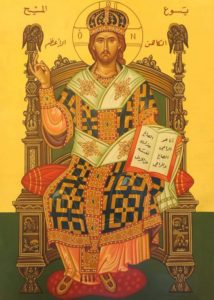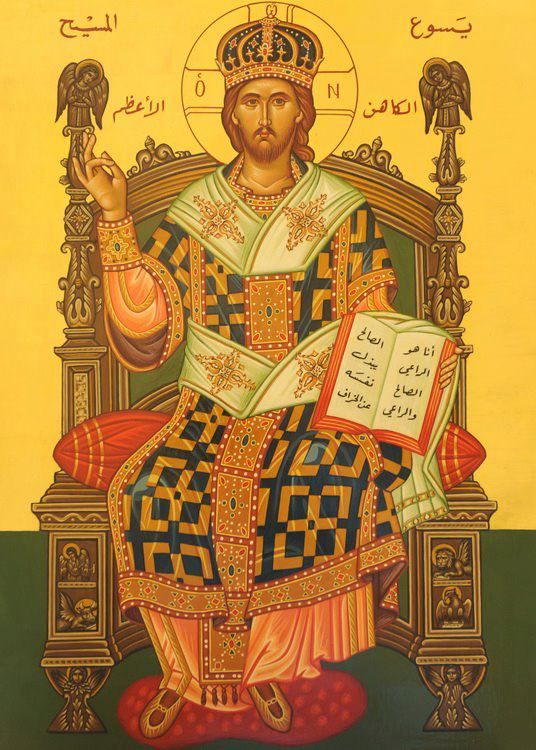
Central Idea: God elevates humanity. Doctrine and practical application: We are a priestly, prophetic, and royal people.
To access Lectionary 91, click here.
Reading 1: Ex 19:2-6a
In those days, the Israelites came to the desert of Sinai and pitched camp.
While Israel was encamped here in front of the mountain,
Moses went up the mountain to God.
Then the LORD called to him and said,
“Thus shall you say to the house of Jacob;
tell the Israelites:
You have seen for yourselves how I treated the Egyptians
and how I bore you up on eagle wings
and brought you here to myself.
Therefore, if you hearken to my voice and keep my covenant,
you shall be my special possession,
dearer to me than all other people,
though all the earth is mine.
You shall be to me a kingdom of priests, a holy nation.”
- Through the Mosaic Covenant, Israel became dear to God.
- Through the New Covenant of Jesus Christ, we the baptized become dear to the Blessed Trinity.
- We Christians are truly a kingdom of priests, since we offer every aspect of our lives to God as a sacrifice for our salvation and the salvation of the world. This is God’s gracious plan of letting us participate in His Redemption.
Responsorial Psalm Ps 100:1-2, 3, 5
R. We are his people: the sheep of his flock.Sing joyfully to the LORD, all you lands;
serve the LORD with gladness;
come before him with joyful song.Know that the LORD is God;
he made us, his we are;
his people, the flock he tends.The LORD is good:
his kindness endures forever,
and his faithfulness to all generations.
- Even though life can be very tough sometimes, it is a joyful thing to know you are one of God’s creatures and to live accordingly.
- Even more joyful is to know you belong to God as a child of God and to live accordingly.
- Our lives and activities serve our neighbor, but first they serve the LORD.
- When we consciously serve the LORD we are being priestly.
Reading 2: Romans 5:6-11
Brothers and sisters:
Christ, while we were still helpless,
yet died at the appointed time for the ungodly.
Indeed, only with difficulty does one die for a just person,
though perhaps for a good person
one might even find courage to die.
But God proves his love for us
in that while we were still sinners Christ died for us.
How much more then, since we are now justified by his blood,
will we be saved through him from the wrath.
Indeed, if, while we were enemies,
we were reconciled to God through the death of his Son,
how much more, once reconciled,
will we be saved by his life.
Not only that,
but we also boast of God through our Lord Jesus Christ,
through whom we have now received reconciliation.
- Because of our inherent dignity due to having rational souls, we tend to think we are pretty awesome.
- But because of our fallen human nature, ignorance, and sins, we are wretched.
- God’s will is to save us, reconcile us to Him, and then elevate us.
Gospel: Matthew 9:36—10:8
At the sight of the crowds, Jesus’ heart was moved with pity for them
because they were troubled and abandoned,
like sheep without a shepherd.
Then he said to his disciples,
“The harvest is abundant but the laborers are few;
so ask the master of the harvest
to send out laborers for his harvest.”Then he summoned his twelve disciples
and gave them authority over unclean spirits
to drive them out and to cure every disease and every illness.
The names of the twelve apostles are these:
first, Simon called Peter, and his brother Andrew;
James, the son of Zebedee, and his brother John;
Philip and Bartholomew, Thomas and Matthew the tax collector;
James, the son of Alphaeus, and Thaddeus;
Simon from Cana, and Judas Iscariot who betrayed him. Jesus sent out these twelve after instructing them thus,
“Do not go into pagan territory or enter a Samaritan town.
Go rather to the lost sheep of the house of Israel.
As you go, make this proclamation: ‘The kingdom of heaven is at hand.’
Cure the sick, raise the dead, cleanse lepers, drive out demons.
Without cost you have received; without cost you are to give.”
- Christ gave the apostles the gospel for free and they are to give it to others for free also.
- However, it was not free for Our Lord. It cost him a lot.
- Giving the gospel to others was not free for the apostles either. It cost them a lot.
- We received the gospel for free.
- Yet to live the gospel is not free. It costs us a lot.
- Christ and the apostles gave, and the Christian gives, 100% to the gospel. This means we subordinate everything we do to God’s will.
- Another way of looking at our Christian lives is we live the fourth through tenth commandments in light of the first three commandments.
Doctrine and practical application: We are a priestly, prophetic, and royal people
- Jesus Christ is THE priest, prophet, and king. Yet the “whole People of God participates in these three offices of Christ” (CCC 783).
- A priest offers good things to God. Each of us can act as a priest by offering our lives, our work, our sufferings to God. We do this for our own good and the good of others.
- One way we can do this by making a morning offering.
- Another is to offer our lives and our intentions to God during the Offertory of the Mass when the sacramental priest offers the bread and wine.
- Another is to “offer it up” each time we face a difficulty. We can offer the difficulty for a specific intention.
- We can also offer acts of reparation whenever we witness moral evils.
- A prophet tells the truth. Each of us can act as a prophet by living and speaking the moral law and adhering to and spreading the truths of our Catholic faith. Thus, we can become “Christ’s witness in the midst of this world” (CCC 785).
- One way to be a prophet is to do the right thing.
- When it is prudent, we can also say what the right thing is.
- Parents act as prophets by their example and words to their children.
- A king rules. With God’s help, each Christian is to rule himself or herself. In addition, with Christ as our model, we rule by serving others. “Christ, King and Lord of the universe, made himself the servant of all, for he came ‘not to be served but to serve, and to give his life as a ransom for many.’” (CCC 786)
- Self-control is a key virtue to cultivate to be a king or queen or prince or princess modeled after Jesus Christ and his Blessed Mother.
- Another kingly virtue is humility, which is a correct appraisal of our talents, abilities and limitations, and then acting accordingly.
- We also are kingly when we take care of everything God has entrusted to us. This is the idea of stewardship.
- Most of all, we are royal Christians when we serve the needs of others. Everyone is dependent on everyone else. Everyone around us is in need.
The Homiletic Directory suggest the following themes for the Eleventh Sunday in Ordinary Time, Year A:
- CCC 551,761-766: the Church prefigured in Old Testament community
- CCC 783-786: the Church a priestly, prophetic, royal people
- CCC 849-865: the apostolic mission of the Church

Leave a Reply